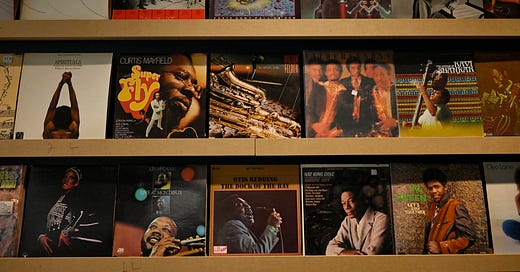As a general rule, you can tell how much fun Kevin and I are having on a given installment of this series by how far each newsletter wanders. This isn’t to say we aren’t enjoying ourselves when we are in Hater Mode (still salty about Kevin putting What’s Going On at #36), or in the comments where we really are just talking music as hard as we can. This absolutely beats working, and writing copy for perpetually displeased clients whose taste in creative is essentially ChatGPT but cover half the print ad in legal boilerplate. I love a peripatetic approach to gushing about our favorite albums, just because it covers distance in both geography and time, and the pacing of our content schedule prevents me from interrupting this progress with unhinged diatribes about this distressing/dispiriting presidential election or a long story about a particularly large sandwich I got from Monica’s Mercato in the North End of Boston in 2018.
Below, you’ll find my Top 100 Albums (from 30-21) and the reason why I chose them, as well as Kevin’s picks and my response to them. For Kevin’s explanations of his albums and his reaction to my picks, check out his list below (and subscribe to On Repeat!).
My #30: Led Zeppelin IV - Led Zeppelin (1971)
This is the definitive Led Zeppelin and hard rock album. If you also grew up on classic radio, it often felt like you were listening to Led Zeppelin IV on shuffle. I didn’t have to own a copy of the album to have heard it in its entirety dozens of times. Given its cultural stature and cementation into the musical pantheon, IV can feel like an album of moments more than songs, probably because every track has a few instantly identifiable sections that always seem to be playing somewhere nearby. The circular guitar in “Black Dog,” the chiming mandolin in “Going to California,” that badass opening drum beat and slide guitar riff in “When the Levee Breaks.” Of course, there is the ubiquitous “Stairway to Heaven,” which cycles between deep reverence and jeering parody; I both love it and hate it and only ever listen to it within the context of this album. Led Zeppelin IV is a petri dish overflowing with stem cells that formed the basis of anything that could even be remotely considered “hard rock.”
Highlights: Everything
Kevin’s #30: Doolittle - Pixies (1989)
My Take:
Well, you’ve already read my take on Doolittle. It’s dope, and we are at the point of our lists where there is increasing convergence.
My #29: Bitches Brew - Miles Davis (1970)
I’ll never forget the drive back from Montreal the day after seeing Radiohead headline the Sunday leg of Osheaga in the summer of 2016. Cruising south on I-91 through the endless rolling foothills of the Berkshires, buzzing off a joint and an Adderall, and nodding along to the beauty, subtlety, and sheer magnificence of Bitches Brew. Opting for the iconic Kind of Blue would’ve been the easy choice for my list, and it is undeniably a cultural touchstone, but this album is so rich in substance and form that it takes your imagination on soaring flights.
Miles Davis embraces aesthetics and improvisation, fusing jazz with Latin music, avant-garde, rock, and funk. The interesting use of panning and the double drumming are just part of this gigantic torso of bursting and noisy music that refuses to resolve itself under any recognizable guise. Considering Bitches Brew dropped in 1970, it is still mind-bending and otherworldly, and each listen transports me into a weird psychedelic surreal setting. This record is not just adventurous and defining for jazz fusion, but the performances, clarity, and richness of the production are stunning.
Highlights: Everything
Kevin’s #29: Tapestry - Carole King (1971)
My Take:
I am ashamed to admit that I have never listened to Tapestry beyond the singles. This album is soulful, with almost a gospel-y vibe that somehow gives off an intimate, sweet serenity and unmistakable maternal energy. The lyrics are like little life companions to navigating the doubts and disappointments of everyday life. Even in these crafted pop tunes, they carry a raw feeling, careful phrasings, and a little sparkle. I understand why Kevin put this so high on his list and why it’s regarded as one of the best releases of the ‘70s.
My #28: In the Court of the Crimson King - King Crimson (1969)
If prog rock as a distinctive genre can be said to have had a genesis, In the Court of the Crimson King is probably it. The manic, transformative head trip that is on this album is effectively summed up in the Schizoid Man’s face—a man mid-scream, nostrils flared, gaze fixed on a distant horror. These five tracks are a towering achievement of menacing rock, lyrical wonder, classical sophistication, pastoral psychedelia, and free-jazz mania. The music is a surreal work of force designed to provoke and scare. “21st Century Schizoid Man” is one of the greatest album intros ever put to record: Nuclear proto-metal riffs, wailing alto saxophone, stuttering jazz-rok drum fills, distorted shrieking and paranoid prophecies. In the Court of the Crimson King is a brilliant mixture of jolting and airy, melody and freakout, fast and slow, atmospheric and electric.
Highlights: Everything
Kevin’s #28: London Calling - The Clash (1979)
My Take:
I understand why the Clash’s debut is highly regarded and considered a punk rock classic, but I don’t get how anyone could compare it to London Calling. This album transcends punk; it is one of the greatest rock albums ever made. The Clash became a much more interesting band when they branched out into rockabilly, reggae, dub, disco, and dance. London Calling has all that genre blending in spades and is their true artistic achievement.
My #27: Let It Bleed - Rolling Stones (1969)
Beggars Banquet, Let It Bleed, Sticky Fingers, and Exile on Main St. are in the conversation for the greatest run of albums in history. Let It Bleed takes the nod on my list because no other record released from this era has better captured the sense of palpable dread that hung over the late-‘60s. Whether it’s spiritual, menstrual, or visceral, this album will leave you covered in blood. Over 50 years out, “Gimme Shelter” and “You Can’t Always Get What You Want” are still definitive rock singles and respectively set up and close out this album perfectly.
This is the album where the Stones best lives up to their reputation as the anti-Beatles, released in arguably their most tumultuous, press-baiting year (Brian’s death, the comeback U.S. tour and Altamont, the hit single “Honky Tonk Women”). Let It Bleed has three masterpieces, their most envelope-pushing lyrics, a definitive album cover, Keith’s best ballad (that he sang, anyway), blues that sounded fresh and original, and a handful of their hardest rockers. Sure, the tracklist would be stronger with “Honky Tonk Woman,” but then we wouldn’t have “Country Honk” or the version on Ya-Yas with different lyrics in 1970, and the Stones wouldn’t have called attention to the song’s, and their own, versatility. This is my favorite Stones album: Raw, crass, murky, and haunting.
Highlights: Gimme Shelter, Country Honk, Live With Me, Midnight Rambler, Monkey Man, You Can’t Always Get What You Want
Kevin’s #27: Give Me the Night - George Benson (1980)
My Take:
This is a very well-crafted and performed pop album, and of course, Qunicy Jones is the master catalyst behind it. Benson’s voice has this beautiful floating quality to it, and it pairs well with the rich instrumentals. Highlights on here are “Off Broadway,” “Moody’s Mood,” and “Dinorah, Dinorah.”
My #26: Journey in Satchidananda - Alice Coltrane (1971)
I hope this write-up brings more people aboard the Alice Col-train, because this record is a masterpiece in exploratory jazz. Alice Coltrane and Pharoah Sanders were locked in on this recording as her dense and reverberating harp runs and his heated sax solos feed off each other’s energy, and the hypnotic bass lines and droning tambora provide a groovy backdrop.
The record occupies the liminal spaces between East and West, post-bop and raga, grief and healing, consciousness and transcendence, and it embodies the universalist teachings of Swami Satchidananda. The music on Journey has no beginning or end, the textures are defined by process, transition, and flow. There is a feeling of loss along with newfound understanding and self-expression, the magnificent soundscapes carry a deep sense of healing and subsequent transformation in the face of grief. It’s a great album to play during a rough day. The influence of Alice Coltrane can be heard in the Mars Volta, Sun O)))’s Monoliths and Dimensions, and her nephew Flying Lotus features her on his song “Auntie’s Harp.”
Highlights: Everything
Kevin’s #26: Pretty Hate Machine - Nine Inch Nails (1989)
My Take:
I respect the Nine Inch Nails pick, although I would’ve gone with The Downward Spiral. But I can’t deny how harrowing and catchy the music is on Pretty Hate Machine. Trent Reznor brought his panoramic vision and trademark loathing to this project and scanned the spectrum of dance music and industrial-strength noise. The lyrics are full of tortured confusion and self-obsession. This is a great entry point for anyone getting into NIN.
My #25: Electric Ladyland - The Jimi Hendrix Experience (1969)
Electric Ladyland is one of the most significant double albums in rock history, and it is unfiltered and uninhibited proof of Jimi Hendrix’s far-reaching ambitions. He was a once-in-a-lifetime guitarist not just because of his technical ability, but because of his ability to express himself through his instrument as an extension of his soul. Electric Ladyland is loaded with lengthy jams, wild solos, surreal effects, and unorthodox mixes.
Even sober, I feel like I’m listening to this album high. “Electric Ladyland” sounds like you’re floating on your back down a red carpet that's unfurling from the center of a giant flower and inside are LSD sex bots. That watery and phased-out instrumentation is contrasted by the overwhelming and aggressive “Crosstown Traffic,” with its chaotic mix, weird panning, and powerhouse riffs. “Voodoo Chile” is just mesmerizing and orgasmic. “Long Hot Summer Night” is swaggering, with these wild brash opening licks and bright piano embellishments while it sounds like a couple of ghosts are singing. “Gypsy Eyes” seems like it’s on the verge of falling apart, with untamed riffs and propulsive soloing. The dueling saxophones and guitar leads and the spoken word in “Rainy Day Dream Away” paint a picture of getting high and slowly falling into a dream state while it’s raining outside before fading into “1983,” a lengthy blues/psych/prog jam about being a merman and straight chillin’ in Atlantis. Jimi transforms Bob Dylan’s “All Along the Watchtower” into his song, which is the best thing anyone can do with a cover.
The saddest aspect of Hendrix’s passing was that he was just getting started. Although he blew minds with his guitar playing, he was still finding his feet as an artist and songwriter, and we'll never fully comprehend his loss.
Highlights: Everything
Kevin’s #25: Complete & Unbelievable: The Otis Redding Dictionary of Soul - Otis Redding (1966)
My Take:
Otis Redding was a tough one to leave off my list, and I regret it. Otis Blue is my favorite of his, but this record is also amazing (obviously). The instrumentation is supple but propulsive, fitting his smoky and at times almost languorous voice. Otis was at the peak of his powers here.
My #24: Madvillainy - MF Doom & Madlib (2004)
Madvillainy is a defining record for abstract hip-hop. Madlib’s production brings a symphony of densely constructed chaos, and his obtuse samples are smart and never played-out, and everything sounds fuzzy and crackling with dust. This oddball, cartoon-heavy backdrop dovetails brilliantly with MF Doom’s witty wordplay and genre-defining bars. The tracklist contains many cuts that operate almost like a rough mixtape; it’s a bit of a potpourri thing jumping all over the place but still adding to this record's overall personality.
I’ll never forget the day I first heard Madvillainy: I was 16 and played it on my laptop while I was in the bathroom getting ready for school. It was the most bizarre rap album I’ve ever encountered up to that point, but like a sticky pop song, it was inescapable. This LP is inexhaustibly brilliant, a great gateway into alternative hip-hop, and it gets more relevant with each passing year. Everyone from Billy Woods to Earl Sweatshirt to even Drake has a place in their hearts for MF Doom. Any fan of hip-hop can appreciate the creativity on this album because it is experimental, eclectic, hysterical, perplexing, arresting, thought-provoking, raw, spontaneous, and just plain silly. RIP to the Masked Maestro.
Highlights: Accordion, Meat Grinder, Raid, America’s Most Blunted, Sickfit, Figaro, Strange Ways, Fancy Clown, Eye, Supervillain Theme, All Caps
Kevin’s #24: The Cars - The Cars (1978)
My Take:
There’s a reason why this is referred to as The Cars’ Greatest Hits. Ric Ocasek wrote a bevy of catchy, hardheaded-to-coldhearted new wave classics eased by wryly rhapsodic touches. The band’s playing is tight and tough, easy and eccentric. There is no pun intended here, but this is great driving music.
My #23: I Never Loved a Man the Way I Love You - Aretha Franklin (1967)
This album defined Aretha Franklin as the “Queen of Soul” by transforming her from a good talent to a great legend. I Never Loved a Man the Way I Love You is her 11th(!) album, but it marked the first in which she ditched Broadway tunes and jazz standards and embraced her gospel heritage.
Few albums can change society’s collective social consciousness, but this is at least as impactful as Public Enemy’s It Takes a Nation of Millions to Hold Us Back or Bob Dylan’s The Time’s They Are a-Changin’. Don't be fooled by the diva veneer, I Never Loved a Man the Way I Love You addresses civil rights and feminism. “Respect” was originally written and recorded by Otis Redding in 1965, and it began as the grumblings of a desperate man who will give his woman anything as long as she puts out (“respect” being a euphemism for sex). With a few lyrical tweaks, Aretha Franklin made the song about literal respect, asking only for human dignity. Even with this album’s concern for social justice, Franklin never loses her sense of love and romance as is seen in the title song and "Do Right Woman, Do Right Man.”
The instrumental superstars are saxophone virtuoso King Curtis, exemplary bassist Tommy Cogbill, and the legendary Muscle Shoals Rhythm Section. The backup singers—which include Franklin sisters Carolyn and Erma, as well as Cissy Houston (Whitney Houston’s mother)—also ooze talent. But Aretha’s impressive mezzo-soprano voice shines brightest and makes this record an all-timer.
Highlights: Respect; Soul Serenade; Good Times; A Change Is Gonna Come; Do Right Woman, Do Right Man
Kevin’s #23: Purple Rain - Prince (1984)
My Take:
Purple Rain is a perfect album. Prince is one of the best singers, songwriters, multi-instrumentalists, producers, and conceptualizers of all time. He is one of popular music’s true eccentrics and creatives, a once-in-a-lifetime artist. A record like Purple Rain cannot be praised enough.
My #22: Remain in Light - Talking Heads (1980)
David Byrne and company and Brian Eno killed it on this forward-thinking, funky, and sort of sinister and unsettling album. Given all the grooves on the surface, the Talking Heads pulled from all these funk and Afrobeat influences and fed them through this surreal and strange, psychedelic, atmospheric, very dark lens and reinterpreted them to feel a little more cold and digital. This compounded into one of the best, weirdest, and most irresistible listens of the 80s. Some moments are incredibly visceral and exciting like “Crosseyed and Painless” and then there are classics like “Once in a Lifetime” that seem like you’re stuck in some kind of freaky dream state. The first leg of the record is thrilling. The last leg has ambient leanings that are quite alluring and something you can get lost in. The influence of this record can still be felt today in many post-punk records and groups like LCD Soundsystem. The ideas on Remain in Light are just universally fantastic.
Kevin’s #22: Talking Heads: ‘77 - Talking Heads (1977)
My Take:
So Kevin matches my Remain in Light with Talking Heads ‘77. The production on this one is pretty balanced and straightforward, and it's also hard not to hear the incredible amount of potential in the fusion of dance and funk music that straddled the mainstream in the underground—even if I think these songs were executed much more proficiently in live settings such as The Name of this Band is Talking Heads and Stop Making Sense. The unsettling performance style would eventually set them apart from every other CBGB-era band. This album is equal parts clunky and slick, and the drums, guitars, and bass sound slightly claustrophobic, but Talking Heads made up for that with great grooves, great tunes, and lots of personality. This album is among my favorites from Talking Heads but their run from More Songs About Buildings and Food to Speaking in Tongues is just legendary.
My #21: The Rise and Fall of Ziggy Stardust and the Spiders from Mars - David Bowie (1972)
David Bowie’s discography is so diverse and consistent that it’s hard to pick a favorite between Ziggy, Low, Scary Monsters, Heroes, Station to Station, and Blackstar. But Ziggy’s impact on glam rock and the broader culture cannot be overstated. It purports to be a concept album but doesn’t have a coherent concept. It is, nonetheless, a fantastic set of songs with interesting meditations on the poisonous effects of fame after pursuing a glamorized image of it, as well as the relationship between art and image and sexuality.
These statements are subtle, buried in catchy hooks and choruses, overflowing massive riffs, beautiful and visceral instrumentation. “Five Years” opens the album with Bowie’s grandest sci-fi apocalypse yet, and “Rock ‘n’ Roll Suicide” is an epic closure that puts a neat bow on how fame and ego can destroy a person and everything around them. Mick Ronson shreds his way to the guitar pantheon.
Bowie is one of the earliest examples of an artist who makes me feel like I’m listening to a stage show, a singer under a hot spotlight, and delivering a theatrical performance. Other artists came before and after Ziggy and they have also played characters and told great stories, but Bowie embodied this sense of drama to the extreme. When so many called his death untimely despite his passing at age 69, it is a tacit testament to how much Bowie was still at the forefront of music and pop culture.
Highlights: Five Years, Soul Love, Moonage Daydream, Starman, Lady Stardust, Star, Ziggy Stardust, Suffragette City, Rock ‘n’ Roll Suicide
Kevin’s #21: Revolver - The Beatles (1966)
My Take:
I can’t say enough good things about Revolver. I deliberated over whether this or White Album was going to crack my list, but what makes the Beatles such a juggernaut is they have conceivably five or six albums that could be argued to be their best and amongst the greatest rock albums of all time. “Tomorrow Never Knows” might be one of the best songs ever recorded; if it dropped in 2024, it would still be considered a cutting-edge, forward-thinking jam, and it dropped in … *checks notes* … 1966!
And that’s it for this week! Next Wednesday, we’ll be dropping 20-11.
Kevin and I also created a Spotify playlist of one song from each of our album picks. Check it out!










It is getting really interesting to see how for you and Kevin, as you get into the top 30 for every expected and respected gem you guys both throw in things I have never heard but must now go and check out. I have sampled MF Doom but will listen to this and I have never heard anything by Alice Coltrane but absolutelywill listen to this in full, thanks to your amazing shoutout.
I cannot argue with any choices as all are bonafide works of genius. I struggle with Zep IV purely as you eluded to that it is the most overplayed album in rock radio history, as in it was played to death for me.
So many gems here....